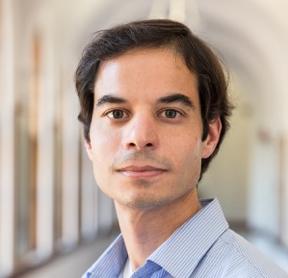
Derek Narendra, M.D., Ph.D.
Senior Investigator
Mitochondrial Biology and Neurodegeneration Section, Neurogenetics Branch (NGB)
NINDS
Research Topics
Neurodegeneration is an increasing and unmitigated disease burden in our aging population. Among its causes are damaged mitochondria that accumulate with age, particularly in post-mitotic neurons and myocytes. Our group studies monogenic disorders to uncover mitochondrial stress responses that curb mitochondrial damage in neurodegeneration. Our focus includes PINK1 and Parkin, which form a stress-induced mitophagy pathway that targets damaged mitochondria for degradation. Mutations in these genes are the most common recessive forms of Parkinson's disease, linking mitophagy to neurodegeneration. We are additionally focused on dominant mutations in the paralogs CHCHD2 and CHCHD10, which cause Parkinson's disease, amyotrophic lateral sclerosis, frontotemporal dementia, and myopathy. In addition to enabling precision therapies for neurogenetic disorders, our work is uncovering fundamental mitochondrial stress responses to mitochondrial damage.
Biography
Dr. Narendra received his B.A. from Columbia University in 2002, Ph.D. from University of Cambridge in 2012, and M.D. from the University of Michigan in 2012. He identified a novel mitophagy pathway involving the coordinated activities of Parkin and PINK1, mutations in which are the leading cause of Early Onset Parkinson's Disease. He completed the Brigham and Women's Hospital & Massachusetts General Hospital Harvard Neurology Residency Program in 2016 and the Movement Disorders fellowship at Penn Neurology in 2020. In 2017, Dr. Narendra received the McFarland Transition to Independence Award for Neurologist-Scientists and joined the NINDS as an Assistant Clinical Investigator within the Neurogenetics Branch (NINDS). He was awarded a Lasker Clinical Research Scholarship and became a tenure track investigator in 2020. In 2022, he was awarded the Grass Foundation - American Neurological Association Award in Neuroscience. He was elected to the American Society for Clinical Investigation in 2025. His laboratory focuses on mitochondrial dysfunction and stress responses in neurodegeneration.
Selected Publications
- Lin HP, Petersen JD, Gilsrud AJ, Madruga A, D'Silva TM, Huang X, Shammas MK, Randolph NP, Johnson KR, Li Y, Jones DR, Pacold ME, Narendra DP. DELE1 maintains muscle proteostasis to promote growth and survival in mitochondrial myopathy. EMBO J. 2024;43(22):5548-5585.
- Narendra DP, Youle RJ. The role of PINK1-Parkin in mitochondrial quality control. Nat Cell Biol. 2024;26(10):1639-1651.
- Shammas MK, Huang X, Wu BP, Fessler E, Song IY, Randolph NP, Li Y, Bleck CK, Springer DA, Fratter C, Barbosa IA, Powers AF, Quirós PM, Lopez-Otin C, Jae LT, Poulton J, Narendra DP. OMA1 mediates local and global stress responses against protein misfolding in CHCHD10 mitochondrial myopathy. J Clin Invest. 2022;132(14).
- Zhu W, Huang X, Yoon E, Bandres-Ciga S, Blauwendraat C, Billingsley KJ, Cade JH, Wu BP, Williams VH, Schindler AB, Brooks J, Gibbs JR, Hernandez DG, Ehrlich D, Singleton AB, Narendra DP. Heterozygous PRKN mutations are common but do not increase the risk of Parkinson's disease. Brain. 2022;145(6):2077-2091.
- Narendra DP, Guillermier C, Gyngard F, Huang X, Ward ME, Steinhauser ML. Coupling APEX labeling to imaging mass spectrometry of single organelles reveals heterogeneity in lysosomal protein turnover. J Cell Biol. 2020;219(1).
Related Scientific Focus Areas



Molecular Biology and Biochemistry
View additional Principal Investigators in Molecular Biology and Biochemistry


This page was last updated on Thursday, November 20, 2025